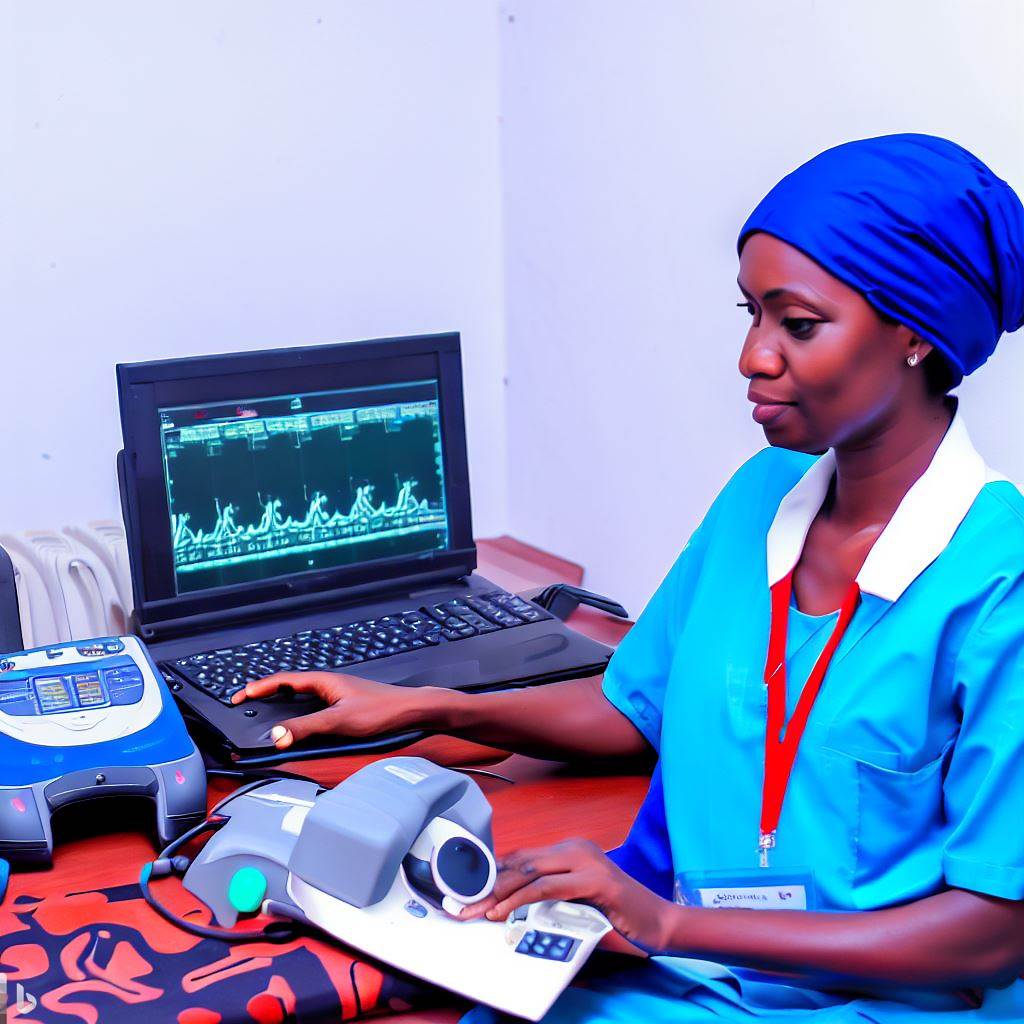Introduction
Sonographers are medical professionals who use ultrasound technology to diagnose and monitor medical conditions.
Sonography is vital in the healthcare industry for its non-invasive nature and ability to create detailed images.
The work environment of sonographers in Nigeria involves working in hospitals, clinics, and diagnostic centers.
Educational Requirements for Sonographers in Nigeria
Accredited training programs
- Sonographers in Nigeria are required to complete accredited training programs.
- These programs can be obtained through universities, colleges, or vocational schools.
- Accredited programs ensure that students receive proper education and training in ultrasound technology.
- Students will learn about anatomy, physiology, medical terminology, and sonographic techniques.
- The duration of these training programs typically varies from 1 to 4 years, depending on the institution.
- Upon completion, students will receive a certificate or a diploma in diagnostic medical sonography.
Certification and registration requirements
- After completing an accredited training program, sonographers must obtain certification and register with relevant authorities.
- The body responsible for certification in Nigeria is the Radiographers Registration Board of Nigeria (RRBN).
- Sonographers need to pass a certification examination administered by the RRBN to become licensed practitioners.
- This examination tests their knowledge and skills in ultrasound technology and medical imaging.
- Once certified, sonographers will be registered under the RRBN and their names will be placed on a register of practitioners.
- Registered sonographers are then legally allowed to practice in Nigeria.
Continuing education opportunities
- Continuing education is crucial to maintaining and enhancing the skills of sonographers in Nigeria.
- Many professional organizations, such as the Society of Diagnostic Medical Sonography (SDMS), offer continuing education programs.
- These programs allow sonographers to stay updated with the latest advancements in ultrasound technology and techniques.
- Continuing education courses cover topics such as new imaging modalities, scanning techniques, and patient care.
- Attending these courses helps sonographers to improve their diagnostic abilities and provide better patient care.
- In addition, participating in continuing education activities is a requirement for maintaining certification and registration.
Educational requirements play a crucial role in shaping the work environment of sonographers in Nigeria.
Accredited training programs ensure that sonographers receive proper education in ultrasound technology, allowing them to develop the necessary skills for their profession.
Certification and registration requirements further validate their competence and allow them to legally practice.
Continuing education opportunities then enable sonographers to stay updated with the latest advancements in their field and provide the best care to their patients.
Read: A Career in Cardiology: A Heartbeat of Nigerian Healthcare
Job Duties and Responsibilities of Sonographers in Nigeria
Performing ultrasound scans
Sonographers in Nigeria are responsible for conducting ultrasound scans on patients.
They use ultrasound equipment to capture images of the internal organs and tissues.
Interpreting and analyzing scan results
After performing the scans, sonographers in Nigeria analyze the images and interpret the results.
They look for any abnormalities or signs of disease that may be present in the scan.
Collaborating with other healthcare professionals
Sonographers in Nigeria work closely with other healthcare professionals, including doctors and radiologists.
They discuss the scan results and collaborate to determine the best course of action for the patient.
Ensuring patient safety and comfort during scans
One of the key responsibilities of sonographers in Nigeria is ensuring the safety and comfort of their patients during scans.
They carefully position the patient and communicate any necessary instructions throughout the procedure.
They also follow strict safety protocols to minimize any potential risks associated with the ultrasound equipment.
Overall, sonographers in Nigeria play a crucial role in the healthcare system.
They perform ultrasound scans, interpret scan results, collaborate with other professionals, and prioritize patient safety and comfort.
Their skills and expertise contribute to the accurate diagnosis and treatment of various medical conditions.
Without their efforts, the healthcare system would not be able to provide the level of care that patients need and deserve.
Sonographers in Nigeria are invaluable members of the healthcare team.
Read: Spotlight on Psychiatry: Mental Health in Nigeria
Equipment and Technology Used by Sonographers in Nigeria
A sonographer’s work heavily relies on the use of various equipment and advanced technology.
In Nigeria, these professionals utilize a range of tools to effectively carry out their duties and ensure accurate diagnoses.
Ultrasound machines and probes
The backbone of a sonographer’s practice is the ultrasound machine. These machines use high-frequency sound waves to create images of the internal organs and structures in a patient’s body.
In Nigeria, sonographers have access to state-of-the-art ultrasound machines that have revolutionized the field.
Ultrasound machines come in different sizes and configurations, from portable handheld devices to larger, console-based units.
These machines have become increasingly compact and portable, allowing sonographers to perform examinations in various settings, including rural and under-resourced areas.
In addition to the ultrasound machine itself, sonographers depend on a variety of probes, also known as transducers.
These probes come in different shapes and sizes and are designed for specific imaging purposes.
They are equipped with advanced technology, such as Doppler capabilities, to assess blood flow and detect abnormalities.
Other related medical equipment
Alongside ultrasound machines and probes, sonographers in Nigeria use several other medical tools to support their practice. These tools often include:
- Doppler devices for assessing blood flow.
- Gel for lubrication and better contact between the transducer and the patient’s skin.
- Calipers for measuring distances and dimensions on ultrasound images.
- Biopsy needles for collecting tissue samples for further analysis.
- Power injectors for administering contrast agents during certain ultrasound procedures
These additional tools help sonographers in Nigeria deliver comprehensive and accurate diagnostic assessments to their patients.
Advancements in sonography technology
The field of sonography is constantly evolving, and Nigeria is no exception to these advancements.
Sonographers in the country benefit from the utilization of cutting-edge technology, which enhances their ability to provide quality healthcare services.
One significant advancement is the integration of artificial intelligence (AI) and machine learning algorithms into ultrasound systems.
These AI systems can analyze ultrasound images, detect anomalies, and assist sonographers in making more accurate diagnoses.
This technology holds great promise in improving efficiency and accuracy in Nigerian sonography.
Additionally, the implementation of telemedicine in sonography has paved the way for remote consultations and collaborations between sonographers and other healthcare professionals.
Through telemedicine, sonographers can send ultrasound images or conduct live video consultations, enabling them to reach patients in remote areas and enhance access to quality healthcare.
Therefore, sonographers in Nigeria rely on a range of equipment and technology to perform their essential duties.
From ultrasound machines and probes to advanced AI systems and telemedicine, these tools contribute to the accuracy, efficiency, and accessibility of sonography within the country.
Read: Role of Pharmacists in Nigeria’s Evolving Healthcare System

Work Environment Challenges for Sonographers in Nigeria
Limited access to equipment and supplies
Sonographers in Nigeria face the challenge of having limited access to necessary equipment and supplies. This scarcity affects their ability to provide accurate and timely diagnoses.
High patient volume and time constraints
The work environment for sonographers in Nigeria often involves high patient volumes, causing time constraints. This can lead to rushed procedures and compromised quality of care.
Physical demands of the job
Sonography is a physically demanding job that requires sonographers to stand for long hours, maintain awkward positions, and maneuver heavy equipment. This can lead to musculoskeletal problems and fatigue.
Coping with emotional and sensitive situations
Sonographers in Nigeria face emotional situations, deliver unfavorable news, and cope with distressed patients. Challenges in their work environment include:
- Limited access to equipment and supplies, hindering accurate diagnoses and compromising patient care.
- High patient volume and time constraints, leading to rushed procedures and compromised quality of care.
- Physical demands of the job, causing musculoskeletal issues and long-term disabilities.
- Coping with emotional situations, resulting in stress, burnout, and compassion fatigue.
Improving the work environment is crucial to ensure optimal care delivery for Nigerian sonographers.
Read: Nursing in Nigeria: A Comprehensive Career Guide
Salary and Job Outlook for Sonographers in Nigeria
Average Income Range
- Sonographers in Nigeria earn an average annual income ranging from ₦1,500,000 to ₦3,500,000.
- The salary range is influenced by factors such as experience, qualifications, and location.
- Senior and specialized sonographers may earn higher salaries, reaching up to ₦5,000,000 per year.
Factors Influencing Salary Levels
- Experience: Sonographers with more years of experience often command higher salaries.
- Qualifications: Additional certifications and degrees can lead to salary increments.
- Specializations: Sonographers specialized in areas like fetal and pediatric sonography may earn higher salaries.
- Location: Salaries may vary based on the healthcare facility’s location, with urban areas generally offering higher pay.
Job Opportunities and Growth Prospects
- The demand for sonographers in Nigeria is growing due to an increasing number of healthcare facilities.
- Job opportunities exist in both public and private sectors, including hospitals, clinics, and diagnostic centers.
- Rural areas may have fewer job opportunities compared to urban centers.
- There is a projected 17% growth in sonography jobs in Nigeria, indicating a positive job outlook.
- Advancements in technology and an expanding healthcare sector contribute to the growth prospects.
Essentially, sonographers in Nigeria have a promising salary range with the average income ranging from ₦1,500,000 to ₦3,500,000 per year.
The salary levels are influenced by factors such as experience, qualifications, specializations, and location. With more years of experience, additional certifications, and specializations, sonographers can expect higher salaries.
Urban areas tend to offer higher pay compared to rural regions. Moreover, the job opportunities for sonographers are increasing in Nigeria, with growth prospects projected at 17%.
The expanding healthcare sector and advancements in technology contribute to the positive job outlook for sonographers in the country.
Read: How to Become a Medical Lab Technician in Nigeria
Professional Associations and Support for Sonographers in Nigeria
Nigerian Association of Radiographers and Radiological Technologists (NARRT)
Sonographers in Nigeria have access to the Nigerian Association of Radiographers and Radiological Technologists (NARRT).
This professional association aims to promote the growth and development of radiography and radiological technology in the country.
NARRT provides a platform for sonographers to network, share knowledge, and stay updated with the latest developments in the field.
They organize conferences, seminars, and workshops that focus on advancing the practice of sonography in Nigeria.
Sonographers who join NARRT can benefit from the opportunities to collaborate and build professional relationships with other professionals in the radiography and radiological technology field.
This interaction can help enhance their skills and broaden their understanding of the work environment.
Continuing Education Programs and Conferences
Continuing education programs and conferences play a crucial role in supporting sonographers in Nigeria.
These events provide opportunities for professional development and keeping up with advancements in the field.
Many organizations and institutions regularly organize continuing education programs tailored to the needs of sonographers.
These programs cover a wide range of topics, including new techniques, equipment, and research findings. Participating in such programs allows sonographers to stay updated and provide quality care to patients.
Conferences specifically dedicated to sonography and related fields bring professionals together to exchange ideas, present research findings, and discuss challenges and opportunities in the industry.
These events provide a platform for networking and collaboration among sonographers from different regions of Nigeria.
Mentorship Opportunities for Career Development
Mentorship programs are crucial for the career development of sonographers in Nigeria.
Experienced professionals in the field can guide and support aspiring sonographers in their journey.
Mentorship programs provide a structured platform for knowledge transfer, skill enhancement, and career guidance.
They help young sonographers gain valuable insights into the profession, develop their expertise, and navigate potential challenges.
Establishing mentorship relationships allows sonographers to learn from experienced practitioners and receive support in their professional growth.
Mentors can provide advice, share experiences, and offer guidance on various aspects of the field, including work environment dynamics, career advancement, and skill development.
All in all, sonographers in Nigeria are supported by professional associations such as the Nigerian Association of Radiographers and Radiological Technologists (NARRT), continuing education programs, and conferences, as well as mentorship opportunities.
These resources contribute to the growth, development, and success of sonographers in Nigeria, enabling them to provide quality healthcare services.
Read: The Journey to Becoming a Registered Nurse in Nigeria
Conclusion
A sonographer’s role is crucial in healthcare, with their ability to perform accurate diagnostic imaging and provide valuable insights to doctors.
In Nigeria, sonographers often face challenges in their work environment, including limited resources and inadequate support from the healthcare system.
However, despite these obstacles, aspiring sonographers in Nigeria should be encouraged to pursue their passion.
With dedication and continuous learning, they can make a significant impact on patient care in the country.




